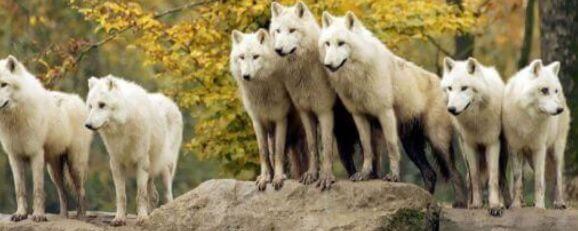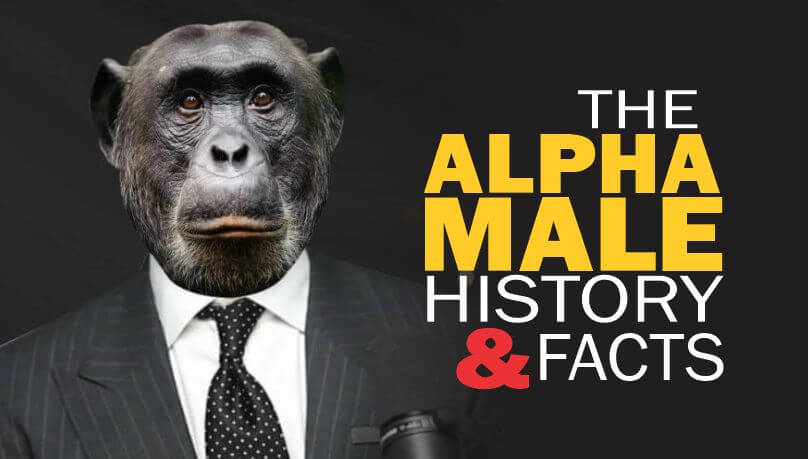Last updated on May 17th, 2024 at 03:06 am
Explore the history and facts surrounding the alpha male concept. From its origins to its modern interpretations, let’s take you through the evolution.
Young men are inundated with dominant male content on how they can exert manliness and be seen as the real men who can have influence and control.
Though this is usually an effect of testosterone, it usually spills over and becomes a problem for young men and society.
This post is handy to expose everything surrounding the alpha rhetoric including its history and how it has transited through the modern age.
Young man! After reading this, you have to beware of the pieces of advice you receive on how to assert yourself over others.
This is going to be a long read, so brace up! It’s worth it. You may want to use the table of contents to navigate the subheadings.
Table of Contents
- Alpha Male Definition and Meaning
- History and Origin of the Alpha male Concept
- Importation and the Evolution of the Human Alpha Male
- The Myth of the Alpha Male Concept
- The Implications of the Alpha Male Concept
- Bringing Everything Together
Alpha Male Definition and Meaning
The term – alpha male is often used to describe a dominant male in a social group who calls the shots and enjoys the best resources there can be, including females, typically one who displays traits such as confidence, assertiveness, and leadership.
The concept has its roots in animal behaviour, where dominant males in a pack or group are often referred to as alphas.
The alpha has the foremost right to pass on his genes to as many generations as he can remain the savage in the group.
He attains this status though through risks of aggression, violence, and intimidation.
Some alpha-wannabes in animals have been mauled to death or sent packing from groups in their quest to become the topmost male in the group.
In humans, the alpha is the man who imitates the dominant alpha in the wild and yearns to be at the topmost hierarchy in human society.
Related: The Alternative to Alpha Male: Embracing Authentic Masculinity
History and Origin of the Alpha male Concept

The concept came from ethology – the study of animal behaviours and has been studied and documented by different biologists since the 1800s.
The study was conducted on many different social animals including chickens, wolves, walruses, fish, and primates (gorillas, bonobos, and chimpanzees)
The study of dominance as an integral part of social behaviour was developed in the 1900s by ethologists while using the terms ‘dominance and alpha to describe the strongest member in a group of animals.
Pierre Huber, an entomologist, appears to be the first to connect the concept of alpha dominance to the social behaviour of bumblebees in 1802.
Also Read: The Challenges and Pitfalls of Being an Alpha Male
According to anthropologist Monika Sumra, ‘alpha’, the first alphabet of the Greek alphabet was first used in the 1900s in academics to designate dominant chickens by a zoologist on the hierarchies of chickens in an order known as pecking.
The chicken pecking order was first discussed by a zoologist and psychologist, Thorleif Schjelderup-Ebbe when he immersed himself in the observation of chickens on a farm.
He observed that hens have a well-established social order that determined who was to peck who in a fight.
According to him, this order of pecking culminated in rankings that emerged from fights over food, and when a chicken is defeated, it submits forever to the winner.
Though the pecking order was not specific to males or females, the focus of this article is on the human-dominant alphas.
Related: What Is An Alpha Male Like In Bed?
The Wolf Pack Behaviour

Coming to wolves that were popular in the study, alpha do not exist in their pack contrary to an earlier study in 1948 by Rudolph Schenkel who thought an alpha pair would fight for dominance to win exclusive rights to mating and territory.
The wolf pack is a popular example of alphadom in the animal literature, which Rudolph Schenkel popularized as he brought together, wolves in captivity to study their behaviour.
In his study, he found that wolves squabbled just like the hens to gain dominance either for food, sex, or other needs which created an order or hierarchy in the group.
The topmost male and female member wolves were named the alpha pair who claimed exclusive sexual rights among the pack.
Related: Why Being Vulnerable Sometimes Is Good for Masculinity
The Wolf Pack Alpha Male Debunked
A wolf researcher with the United States Geological Survey, David Mech debunked the idea of an alpha pair of wolves fighting for dominance for winning mating rights among the group.
But his debunking was not without writing in favour of the research of Schenkel in a book in 1968 – “The Wolf: Ecology and Behavior of an Endangered Species.”
He said that the ‘alpha wolf’ behaviour as observed and reported by Schenkel only appeared in wolves in captivity brought together from different backgrounds.
He went ahead to opine that the true wolf pack begins with a male and female producing offspring and exhibiting the truest wolf behaviour, where the parents are the dominant pair.
In Dave Mech’s Words
“The concept of the alpha wolf is well ingrained in the popular wolf literature, at least partly because of my book “The Wolf: Ecology and Behavior of an Endangered Species,” written in 1968, published in 1970, republished in paperback in 1981, and currently still in print, despite my numerous pleas to the publisher to stop publishing it. Although most of the book’s info is still accurate, much is outdated. We have learned more about wolves in the last 40 years than in all of the previous history.
One of the outdated pieces of information is the concept of the alpha wolf. “Alpha” implies competing with others and becoming the top dog by winning a contest or battle. However, most wolves who lead packs achieved their position simply by mating and producing pups, which then became their pack. In other words, they are merely breeders, or parents, and that’s all we call them today, the “breeding male,” “breeding female,” or “male parent,” “female parent,” or the “adult male” or “adult female.” In the rare packs that include more than one breeding animal, the “dominant breeder” can be called that, and any breeding daughter can be called a “subordinate breeder.”
Dave Mech – Alpha Wolf Concept
Instead of living in packs that have no filial relationship while fighting to dominate for food and mating rights, it turns out that wolves are family oriented with the hierarchy starting with the parents down to the offspring.
The young leave the pack when they are old enough to start their own family.
Mech has debunked the alpha concept in wolves, but the concept could very much be true in some primates, who are the closest relatives of humans.
Adams also goes into other biological misconceptions, like the idea that chimps are our closest relatives and that their alphas win the position through aggression. They aren’t, and they don’t.
The video goes on to point out that human social hierarchies are constantly changing, unlike animals whose behaviours are fixed and born out of instincts. No human is the same kind of person in all situations.
The Alpha Male in Primates

According to a primate behavioural ecologist at Tulane University, Kathy Jack, who studies alpha male behaviour in capuchin monkeys;
“it won’t take you a few minutes to identify the dominant male monkey if shown a group of monkeys in a Costa Rica Forest.”
The capuchin alpha eats first, others make way for him, and he lies in the choicest place for others to get him groomed, an attribute of a dominant member.
In many primates’ literature, the alpha is pictured as a dominant, strong, aggressive, emotionless member of a group with priority access to the choicest resources including females.
Related: What is it Like Dating a Dominant Male?
He is considered attractive, desirable by females, and probably more sexually active
Another researcher, Maslow thought that the dominance of males in primates was similar to the pecking order in chickens and an integral part of all relationships of primates for social cohesion.
Maslow continued that the hypothesis from the study of primates on dominance and ranking could be applied in the study of human social behaviour.
However, in another different research with a deviating view, Carpenter C.R found a positive correlation between rank and sexual behaviour among a group of howler monkeys.
These monkeys maintained social cohesion through cooperation and mutual interest and not through competitive group members or males.
This is an indication that the alpha male concept is not stable or constant with every species.
Importation and the Evolution of the Human Alpha Male
The concept of the alpha has come a long way and continues to evolve especially in the affairs of humans.
The importation of the term into human affairs has been widely criticized by scientists.
Inasmuch as it is okay to compare human and other lower animal’s behaviour for the sake of reference or to drive home a point, as there are intelligent animals.
I am sure it is not right for the ‘alpha’ rhetoric to be imported into the affairs of humans as the alpha behaviour is more instinctive than reasoning, reptilian than modern.
Frans de Waal’s Chimpanzee Politics
The term ‘alpha’ started being applied to humans with the publication of Frans de Waal’s Chimpanzee Politics in 1982, which compared human and chimpanzee behaviours including the dominant behaviour of males who can fight to the death for food, sex, and territory.
Frans De Waal did not outrightly imply there is human alpha, but his book gave the term a new leap and meaning that got people’s interest.
Since then, the dominant male rhetoric has spread with different meanings attached to it, especially among people who are trying to identify with their masculinity.
Among young men, thumbs up are given to men who are dominating, aggressive, and misogynistic as these are the assumed characteristics of the human alpha and a show of masculinity.
Related: The Dilemma of Obsessing with the Alpha Male Status
The dominant male badge is slapped on these characters as a badge of honour for being masculine while encouraging others to join the bandwagon.
To be masculine enough is the aspiration of every young man as it is believed to be the secret to having any woman at their beck and call and be respected by both men and women.
The elusive alpha fantasy has driven a lot of people, especially young men on the path of misogynism – prejudice or hatred for women.
Searching about the human-dominant males on the internet, you will be inundated with articles that teach how to intimidate others and let them know you are the boss.
The Dominant Male Concept Accepted by Humans
There is no doubt the term has been accepted by many even with its many flaws and lack of scientific support, but its foundation would not hold for long.
In the course of discussing the alpha male, it is important some areas are mentioned as they are bits of the dominant male status. Masculinity is one of them.
The Myth of the Alpha Male Concept

Though the alpha concept has been debunked both in humans and some animal species, the term is still a thing in human affairs and is the subject of many articles, books, and discussions.
We will look at the alpha male and beta male dichotomy and also the links between alpha male behaviours and dominance, status, respect, and attractiveness.
These are what make the alpha male concept thick and attractive to the young man as they are believed to make him successful in society and also put him in a better spot to mesmerize women.
Apart from simplifying the multi-dimensionality of masculinity, the alpha concept grossly underestimates the capability of man owing to reasoning and logic.
Also, it does not really give a good argument on what women want in men.
EQ and IQ Knocks off the Alpha Concept
The advent of the discovery of emotional and social intelligence has made a lot of studies and theories obsolete, including the alpha male concept.
Emotional and social intelligence is the ability to know yourself (emotions), your environment (social space), and how to navigate your way with people at home, at work, and every other place you find yourself to your advantage while not putting people at disadvantage.
Since our everyday life and interactions are with our fellow humans, we have evolved many ways to communicate and get things done without exerting a physical force which is what the alpha thrives on.
ALSO READ: How To Avoid Being Mr Nice Guy
This skill has proven to make the dominant male concept look mechanical and prehistoric in a fast-moving world driven by intellectual strength and intelligence.
The world has left the muscular man and his abs and chasing the man who can communicate effectively with emotions, and words and can use self-awareness, self-management, social awareness, and relationship management to manage himself and people for mutual benefits.
So, suppressing emotions and imposing oneself on people instead of appealing to their emotions will elicit undesired outcomes that are antisocial.
The Implications of the Alpha Male Concept
The dominant male concept can have both positive and negative implications, depending on how it is interpreted and applied.
On one hand, the idea of alpha can promote positive traits such as confidence, assertiveness, and leadership, which can be beneficial in many contexts.
For example, in the business world, a leader who displays alpha characteristics may be able to inspire and motivate their team to achieve their goals.
However, it can also have negative implications, particularly when it is used to reinforce harmful gender stereotypes and promote toxic masculinity.
This can lead to a culture that glorifies aggression, dominance, and power, which can be harmful to both men and women.
Related: The Dominant Male and the Controversy, Types, And Impact On Society
For example, men may feel pressure to conform to a narrow and unrealistic set of expectations around masculinity, while women may be objectified and treated as inferior.
Additionally, the idea of an alpha male can be based on flawed assumptions about human behavior, as it relies on the idea that social interactions are fundamentally competitive and hierarchical, rather than cooperative and egalitarian.
Negative Implications
The dominant male concept can also have negative implications, particularly when it is used to reinforce harmful gender stereotypes and promote toxic masculinity.
Some of the potential negative implications of the concept include:
- Aggression: The concept can promote the idea that aggression and dominance are desirable traits, which can lead to violence or abusive behavior. This can be harmful to both the individual and those around them.
- Parochial definition of masculinity: It often presents a narrow and limiting definition of what it means to be a man, which can lead to feelings of inadequacy or pressure to conform. This can be particularly harmful to individuals who do not fit the traditional mold of what is considered “masculine.”
- Objectification of women: It often portrays women as objects to be conquered or dominated, rather than as individuals with their own agency and autonomy. This can contribute to a culture of misogyny and sexism.
- Toxic competitiveness: It can promote a toxic sense of competition, where individuals are encouraged to see others as threats or rivals rather than potential collaborators. This can be harmful to personal relationships, workplace dynamics, and other areas of life where cooperation and teamwork are important.
- Inaccuracy of animal behaviour models: The concept of alpha males is often based on outdated or inaccurate models of animal behavior, which can lead to flawed assumptions about human behavior. For example, the idea that social interactions are inherently hierarchical and competitive, rather than cooperative and egalitarian, is not supported by current research.
It is important to approach the alpha concept critically and avoid reinforcing harmful stereotypes or promoting toxic masculinity.
Embracing a more expansive and inclusive definition of masculinity can be beneficial for individuals, as well as for society as a whole.
Positive Implications
As mentioned earlier, the concept can have some positive implications, depending on how it is interpreted and applied.
Some of the potential positive implications of the concept include:
- Leadership qualities: An alpha male is often seen as a natural leader, with the ability to inspire and motivate others towards a common goal. This can be beneficial in many contexts, such as in the workplace or in a team sports setting, where effective leadership can help to achieve success.
- Confidence: He is often confident in his abilities and decisions, which can help him navigate challenging situations and make tough choices. This can be an important trait in many areas of life, including personal relationships, career, and other areas where self-assurance is valued.
- Assertiveness: They are often assertive in their communication and behaviour, which can help them to get what they want and avoid being taken advantage of. This can be a valuable trait in situations where negotiation or advocacy is required.
- Physical fitness: In animal behaviour, the alpha is often the strongest and fittest member of the group. This can translate to human behaviour, where physical fitness and athleticism are often seen as desirable traits. This can be beneficial for overall health and well-being.
- Goal-oriented: They are often driven by a sense of purpose and a desire to achieve their goals. This can be a positive trait, as it can help individuals to stay focused and motivated, even in the face of obstacles or setbacks.
Bringing Everything Together
Human society is intricate and lacks a fixed path to navigate. Flexibility is crucial, and emotional and social intelligence imbued with prestige holds greater appeal for success.
Dominance and prestige are distinct ways to attain status and ascend the social hierarchy, yet their qualities often intertwine.
Rigid alpha-beta categorization is inadequate, as people can embody diverse traits. While dominance may offer transient advantages, long-term success relies on prestige, yielding genuine respect.
Dominance secures short-term victories but lacks enduring governance, contrasting with prestige’s lifelong strategy, which garners sustained admiration and acceptance.
References:
- The Myth Of The Dominant Male
- How America Became Infatuated With a Cartoonish Idea of ‘Alpha Males’
- Living With Wolves: The Alpha Male
- Decades of Centenaries: The Alpha in Irish History
Pious Clements is the insightful voice behind "The Conducts of Life" blog, where he writes about life ethics, self-development, life mastery, and the dynamics of people and society.
With a profound understanding of human behaviuor and societal dynamics, Pious offers thought-provoking perspectives on ethical living and personal growth.
Through engaging narratives and astute observations, he inspires readers to navigate life's complexities with wisdom and integrity, encouraging a deeper understanding of the human experience and our place within society.

